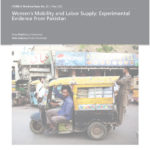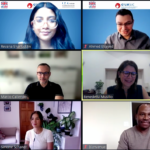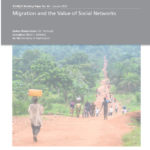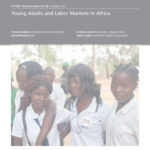Diverse approaches and experiments in the economic literature have shown that offering subsidies and making certain services available do no result in a take-up at an expected scale when targeting those that have been historically excluded from government programmes. Although calculations often have left the non-take-up cases out arguing that whenever subsidies are of the…
Uncategorized
Browser’s Don’t Lie? Gender Differences in the Effects of the Indian Lockdown on Digital Activity and Time Use
When intending to study the time-use choices of working-age individuals and the corresponding gender differences, it is necessary to have information on demographic characteristics of targeted groups as age, children, education etc. More importantly however, researchers need to be able to identify comparable groups through which to assess gender differentials. Gendered effects of COVID-19 are…
Women’s Mobility and Labor Supply: Experimental Evidence from Pakistan
At a relatively high level of education, women in South Asian cities are less likely to participate in the labor market. However, survey data suggest that many women might be “latent job seekers.” In this paper, researchers study potential barriers women might face while entering the urban labor force. For example, in cities with conservative…
Gender Gaps: Back and Here to Stay? Evidence from Skilled Ugandan Workers during COVID-19
The labor market outcomes of COVID-19 in developing countries are just starting to be thoroughly investigated. Given that the state capacity to sustain jobs through retention schemes is much more reduced than in high-income counterparts, the capacity to work from home is much scarcer, it would not be correct to extrapolate results from other countries…
G²LM|LIC COVID-19 Research Meeting: Experts Call for Targeted Local Policies and Long-Term Global Commitment
The COVID-19 pandemic has crippled the world economy, and low-income countries were hit the hardest. To explore emerging policy solutions based on the newest findings on the impact of the pandemic in LICs, G²LM|LIC convened a research meeting on its COVID-19 research projects. Simone G. Schaner of the University of Southern California, Atiya Rahman of…
Assessing the labor market impact of COVID-19 on women with young children in Egypt
The COVID-19 Pandemic has disrupted many routines, labor and services that have helped to cope with responsibilities in general. Due to gender norms in many developing countries, this has come together with a sudden increase in the responsibilities of women within the household, as COVID closures have obligated families, and especially mothers, to attend childcare…
Migration and the Value of Social Networks
The connection between Migration and Social Networks has long been a topic of investigation within the field of Economics. Two distinct mechanisms by which Social Networks affect Migration the literature has investigated the most, are for once, when Networks function as conduits of information and hence facilitate migration, and secondly, when these work as a…
Searching with Friends
It is a fact that Social Networks play a key role in job search efforts. This is even more the case in Developing countries, where over 50% of individuals in job search report to find a job through Social Networks. This thus points to a situation where complementary knowledge among job searchers is quite important…
Young Adults and Labor Markets in Africa
Today, 1 in 5 new jobseekers have been born in Africa, by 2050 this ratio will have changed to 1 in 3. It is evident that by such a shift, societal and economic problems in the continent will worsen the longer jobseekers are not met with more job opportunities, i.e., that the employment demand is…
Jobs of the World Project Launch
Check out the Data Portal of the project here. To see what the project is all about, register to the event here. The Jobs of the World Project is a publicly available resource built to enable researchers to analyse comparable labour market outcomes across countries and time using micro data. At the core of the…




